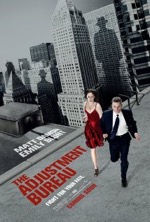The Adjustment Bureau (PG-13)
22/01/14 22:03 Filed in: 2011

Starring: Matt Damon
March 2011
TAKING AIM:
The Adjustment Bureau presents an intriguing premise: what if agents from a secret organization aggressively enforced the rigid adherence to the master plan set forth for a person’s life? This Matt Damon vehicle is a high concept thriller that successfully synthesizes elements from an action flick and a love story, while also traversing some heady, philosophical terrain.
TARGET PRACTICE:
Novel Fact: Adjustment is the latest in the decades-spanning string of movies based upon Philip K. Dick’s sci-fi stories (Blade Runner, Minority Report, etc).
Genre Blender: Though containing elements of a romance, drama, thriller, action and sci-fi film, Adjustment stubbornly resists genre classification, and represents the best parts of each in its mash-up mélange of narrative flavors.
Pervasive Paranoia: Harking back to the widespread suspicion of men in gray flannel suits (think Gregory Peck) during the early stages of the Cold War, Adjustment keenly displaces onto its gray-suited Bureau agents the current and widespread anxieties over lost freedoms (the Patriot Act) and growing distrust of the system (corporate and political corruption). The more things change…
Chemistry: Damon, by now, is unquestionably a bona fide Hollywood leading man. Blunt has spent her career as a sidekick in supporting roles. On paper, Damon and Blunt seem mismatched. Onscreen, the chemistry between the two actors is debatable and, as such, Blunt’s casting is dubious when considering the wealth of A-tier actresses who could’ve, perhaps should’ve, taken her place. One thing’s for sure, the Damon/Blunt pairing doesn’t hold a Bic lighter to the enduring flame of classic romantic couples like Bogart/Bacall and Tracy/Hepburn.
Philosophy: The philosophical topic of fate/chance is broached with conspicuous frequency in the film. The story also grapples with the theological debate over predestination vs. free will. The cerebral lectures on fate are less intriguing here than the gut-wrenching ramifications of making the wrong decision when the future is on the line. What if your action, or inaction, holds negative outcomes for your future self (we saw this illustrated ad nauseam in the Back to the Future trilogy)? Even worse, what if your decision creates catastrophic repercussions for someone you love? Could you set aside your love for that person if it meant ensuring his/her well being, which would otherwise be jeopardized? It’s all hypothetical when couched in a two hour entertainment, but it’s still fun to noodle over.
Digging Deeper: The movie contains some breathtaking views of NYC’s skyscrapers, especially the monolithic corporate buildings, which are artfully framed in the downtown scenes. Also, the film makes effective use of expansive rooms (lobbies, libraries, etc), which, by comparison, make its inhabitants appear like a jellyfish in a gigantic ocean. And speaking of oceans, there’s a fascinating connection between this film and Titanic. In Titanic, good things generally happen at the front of the ship, while bad things usually happen at the back of the ship. Here, large rooms (e.g., empty warehouses) are bad and small rooms (e.g., bathrooms) are good. Another point to consider: the one young black man in the Bureau is characterized as open-minded, flexible and a Good Samaritan, while the numerous old Caucasian men are drawn as rigid, unimaginative enforcers of policies even they question at times. What does this say about the ethnic diversity among the leaders of the emerging global economy? Is the movie prefiguring the impending extinction of the old guard of corporate America? Also, why does the movie succumb to the prevalent “boy’s club” mentality? The Bureau consists entirely of men.
PARTING SHOTS:
Though the movie attempts to tackle some weighty aspects of our existence, are the excessive references to free will a bit overdetermined? If so, is the conclusion too preachy? Is the existential dénouement a cop out (i.e., Back to the Future IIIs sage advice from Dr. Brown, “Your future is whatever you make it. So make it a good one…”)? Even though it’s currently in fashion (especially on TV), did we really need Damon’s voiceover narration to help us interpret his character’s thoughts and feelings?
In the final analysis, Adjustment is a cinematic double-edged sword. Those hoping to see an all-out action, or drama, or romance, or sci-fi film are sure to be disappointed. Still, since it offers something for everyone, Adjustment is sure to reach a wider audience than if it had focused on just one specific genre. Either way, if the film makes people ponder its themes and messages past the exit sign, it will have accomplished it purpose.
Rating: 3